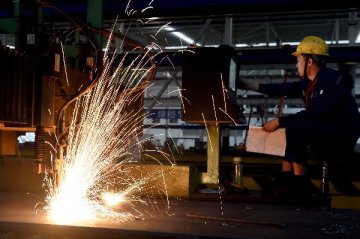
There will be about 255 million people aged at or above 60 in China by 2020, accounting for around 17.8 percent of total population of the country, according to National Health and Family Planning Commission. It is predicted that size of consumption market of the aged will reach 3.3 trillion yuan in China by 2020. However, China’s elderly care industry saw a late start and there’s no beneficial and sustainable retirement pattern yet in spite of support from favorable policies.
Shanghai An Kang Tong Health Management Co., Ltd., an elderly care company under SanPower Group, makes faster moves in elderly care market. “Window phase of China’s elderly care market lies in current two or three years and we carry out mergers and acquisitions (M&A) in order to seize the market quickly.” Peng Jianbo, CEO of the company, told the reporter that “there are many elderly care institutions which are suitable for M&A but few companies with home-based care for the aged. The home-based care for the aged is a mainstream, but most of these enterprises are small companies, input few resources and lack commercial model.”
China’s elderly care market is very attractive. Since China entered aging society in 2010, state-owned enterprises, real estate enterprises and insurance funds has exerted more efforts to exploration and deployment in elderly care industry through self-establishment, M&A and overseas investment. Yet China’s elderly care industry saw a late start and there’s no beneficial and sustainable retirement pattern yet in spite of support from favorable policies.
Enterprises accelerate expansion
Elderly welfare product design competition has been held for five times and sees more competitors and original works this year.
China’s aging population grows fast by now. There will be about 255 million people aged at or above 60 in China by 2020, accounting for around 17.8 percent of total population of the country, according to National Health and Family Planning Commission. It is predicted that size of consumption market of the aged will reach 3.3 trillion yuan in China by 2020.
The huge market has attracted various funds. Shanghai An Kang Tong Health Management is one of the co-organizers of the competition. Information shows that the company is specialized in home-based care for the aged and has served for over 5.78 million elderly users in China by May 2017.
The last time that the company came under spotlight was at the end of last year when Nanjing Xinjiekou Department Store Co., Ltd., a holding listed company of SanPower Group, bought 100 percent equity of the company. In addition to Natali, a company leading in Israeli elderly care industry which was merged into Nanjing Xinjiekou Department Store and Yi Le Ju (Shanghai) Elderly Care Investment Co., Ltd., in which SanPower Group made more investment this year, Shanghai An Kang Tong Health Management has become a comprehensive elderly care service platform with the help of resources of parent company.
“When Shanghai An Kang Tong Health Management encountered development bottleneck, it realized the elderly market is going to see explosive growth. But enterprises need a lot of talents, capitals and technologies in early stage. SanPower Group made deployment in elderly market earlier and attached great importance to it. Besides, the price was reasonable, so they came to agreement.” Peng told the reporter.
Now, Shanghai An Kang Tong Health Management has finished setting up four major service centers, namely, first aid service, life service, healthcare and community service. It builds a medical care service system covering general practitioner and specialist and provides a slew of services including health consultation, precaution at earlier stage, chronic diseases management and recovery at late stage.
In addition, the company establishes smart elderly care complex in Nanjing, Taiyuan of Shanxi province and Fengcheng of Jiangxi province, which are equipped with small day care centers and small nursing homes.
It also begins to undertake M&A. “The market of home-based care for the aged adopts the model of light assets. We input much in the industry in earlier stage, but the investment will be diluted in many projects. Besides, the market is undergoing growth stage. Therefore, we need to make quick expansion.” Peng indicated that “the cooperation between Nanjing Hekang and communication operators is worth learning from. M&A is able to help complement each other’s advantages. The operation model of Shanghai An Kang Tong Health Management can be implemented quickly.”
SanPower Group is also expanding in medial health sector. It is learnt that big health platform of the group includes health care for the elderly, biomedical and hospital management.
Natali’s CEO Fu Wei disclosed that “overall strategic target is to acquire more pension assets and insert them into SanPower Group. It will consider introducing investment partners as acquisition needs support from capitals. It may become a shareholder of some enterprises first and then control and acquire them later. Meanwhile, we are also carrying out self-establishment and expansion.”
Capital is competing for the market
In addition to SanPower Group, other capitals, including state-owned enterprises, real estate companies and insurance capital, are also competing for the elderly care market.
According to the report on the development of China’s healthcare and elderly care industry released by China Health and Senior Care Industrial Alliance Research enter, except investment and acquisition, capital has also entered the elderly care industry via other ways, including that the government encourages social capital to facilitate regional elderly care industry via PPP; smart elderly care platforms are favored by venture capital.
E Junyun, chairman and CEO of Beijing Anxin Elderly Care Industry Co., Ltd., told the reporter that although the threshold for making investment in the elderly care industry is not high, it needs plans for the implementation of polices, industry capital and operation services. These are also major barriers that hinder an explosive growth of the elderly care industry in China.
Elderly care will be mainly home-based care with the support of community. In the 12th Five-Year Plan for the construction of social elderly care service system released as early as February 2011, the Ministry of Civil Affairs proposed that 90 percent of the elderly should be taken care at home with the aid of social services, 7 percent of them should be taken care in communities and 3 percent should be taken care in elderly care service institutions.
However, elderly care service, with wide difference in supply and demand and fierce competition, is a short link in China’s elderly care industry. PricewaterhouseCoopers estimated that the demand for berths in China’s nursing house will grow from 6.59 million in 2015 to 128.5 billion in 2025. Based on the international standard that three old people should be equipped with one caregiver, there is a severe insufficiency of employees in the country’s elderly care industry.
Lou Guofang, head of Pudong Aging Development Center, said that “with the development of the elderly care industry and the popularization of long-term care, the demand for elderly care will expand. Based on the existing job market, there is a large gap of professionals that can provide home-based care services. The government is not studying the cultivation of professional care employees. It not only needs school teaching. But more importantly, it needs trading of professional training agencies.”
In addition, enterprises are facing difficulties in business model.
There are two types of clients in the home-based elderly care market. Peng Jianbo told the report that one is government and enterprises, including large state-owned enterprises and veteran rest center. An Kang Tong’s clients mainly are governments. They should develop service solution based on governments’ project budget.
Beijing Anxin Elderly Care Industry Co., Ltd. mainly aims at the transformation of environment to adopt to elderly care. It has expanded via direct sales, joint operation and chain store. E Junyu believed that home-based elderly care needs to ensure the safety of environment. But most living environment in China is not elderly-friendly at all, and there is no standard for elderly-friendly environment.
“These is no mature business and service model in home-based elderly care, especially those that can be applied in regions and mass. In the future, there will be lots of models. But the transformation of elderly-friendly environment is a basic link in the elderly care service market. I think that it will become one of the most promising models in the elderly care market,” said E Junyu.
Translated by Vanessa Chen
























Latest comments